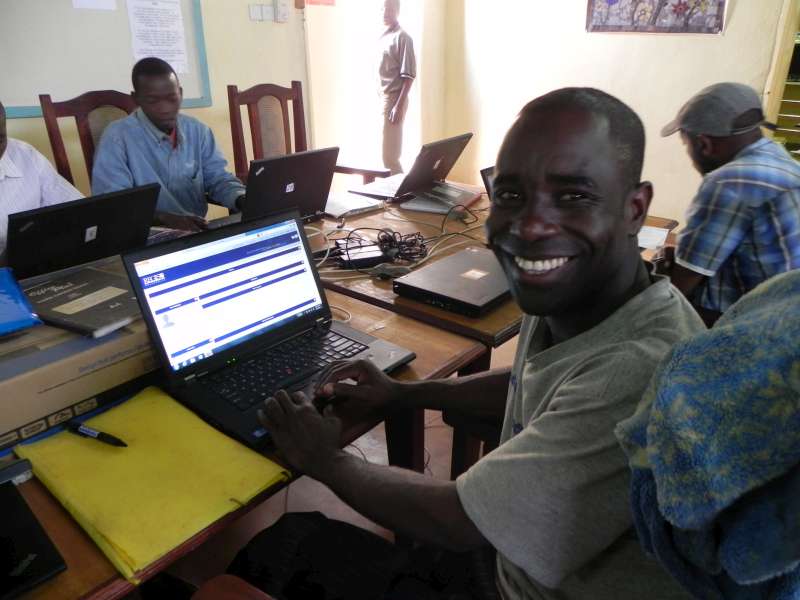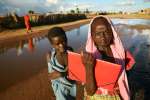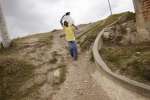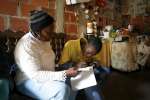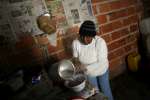- Text size
 |
|  |
|  |
| 
- عربي
Education programme in Malawi gives hope to refugees
News Stories, 7 December 2012
DZALEKA REFUGEE CAMP, Malawi, December 7 (UNHCR) – Jean Lusambo* could hardly believe he would be confined to a refugee camp. The middle-class Congolese burst into tears on arrival.
Originally from Lubumbashi in the southern Democratic Republic of the Congo (DRC), his family was able to send him to university and he was doing well, writing poetry and working as a journalist and part-time musician. He had started to become known for his music and even had a couple of videos playing on local television.
Everything changed when he performed his song about peace at a local concert. The song was perceived to be against the government and he started to be followed. Concerned for his safety, he moved to another city in the DRC but was soon recognized and again felt in danger.
Lusambo decided to flee to Zambia after he received the name of another Congolese person in Lusaka with whom he could possibly stay. But on arrival, the family told him they could not host him for long or they might be arrested.
"At that point I felt very scared. The one who was supposed to help then says they will get in trouble if they are discovered helping me? I felt hopeless," Lusambo recalled. The family let him stay just one night before assisting him to reach the border with Malawi to ask for asylum.
Lusambo – who spoke fluent French, Swahili and Lingala – was unable to communicate with the first immigration officer but after several hours another official showed up who knew some Swahili. He understood Lusambo needed protection and he was allowed to register as an asylum-seeker in Malawi.
Relieved that he would now be safe, Lusambo thought he would be allowed to travel to the capital, Lilongwe; he had money to stay in a guesthouse or hotel. Instead, he was told he would be brought to Dzaleka refugee camp where he would be expected to stay. The only thing Lusambo knew about refugee camps was what he had seen on television.
"I had images of poor people begging for food. I came from a good background. I was well-known and respected. I cried when I got to the camp. I was no longer anyone."
Malawi's current policy does not allow refugees to live or work outside the camp. It hosts more than 15,000 refugees and asylum-seekers, mostly from the DRC, Rwanda, and Burundi. Nearly all reside in Dzaleka refugee camp, approximately 50 kilometres from Lilongwe.
Although he had shelter, food and his basic needs were met, Lusambo became very depressed. He could not see a future.
But at the end of 2010, after more than two years in Dzaleka, UNHCR's implementing partner Jesuit Refugee Services (JRS) started a programme to develop skills to use in the camp. The Community Service Learning Track (CSLT) is aimed at enhancing local vocational or post-secondary education by providing on-site facilitators with access to faculty expertise and materials at Jesuit universities in the US.
The courses, with both online training and class work, target specific needs within the community identified by community members themselves. Current offerings include courses on community health, business and entrepreneurship, communications, and community development. On completion, participants receive a certificate jointly from the university supporting the curriculum and JRS that gives potential for employment with organizations working in the camp.
After completing the communications track, Lusambo and others who did the programme were tapped to produce communication materials needed in the camp, such as health and sanitation messages. Lusambo also produces video podcasts about life in the camp that are shown to residents with important messages from the government, UNHCR and the other partners.
"After the course, I could see my future in another way. I didn't see my life as if it was finished," said Lusambo, who is now 29. "People were interested in me. JRS staff would tell visitors in the camp about me and my work producing videos and communications materials. I realized then I can do greater things than I was. I could play a part. I can be international and maybe my poems will be published."
So far some 165 students – both refugees and members of the local community – have enrolled in classes.
As UNHCR's assistant regional representative (Programme) for southern Africa, Snezana Sazdic says: "It's clear that through this programme refugees are not only gaining skills, they are nourishing their dignity and their sense of self worth."
* Name changed for protection reasons
By Tina Ghelli in Dzaleka Refugee Camp, Malawi
